Dennis Oland in his own words: What he told his murder retrial
Dennis Oland spent three days in the witness box earlier this month, testifying in his own defence at his murder retrial in Saint John.
Below are some highlights of what Oland told the Court of Queen's Bench in his own words during direct examination by defence lawyer Michael Lacy and cross-examination by Crown prosecutor Jill Knee.
Oland, 51, is being retried for second-degree murder in the death of his father, multimillionaire Richard Oland, more than 7½ years ago.
He is the last known person to have seen his father alive during a visit to his uptown office on July 6, 2011, between around 5:35 p.m. and 6:36 p.m.
The body of the 69-year-old prominent businessman was discovered face down on the office floor the next morning with 45 sharp- and blunt-force injuries to his head neck and hands.
An accused doesn't have to testify in his own defence, but Oland said he felt it was important for the court to hear from him in his own words that he didn't kill his father.
"I want to clear my name," he said.
Relationship with father
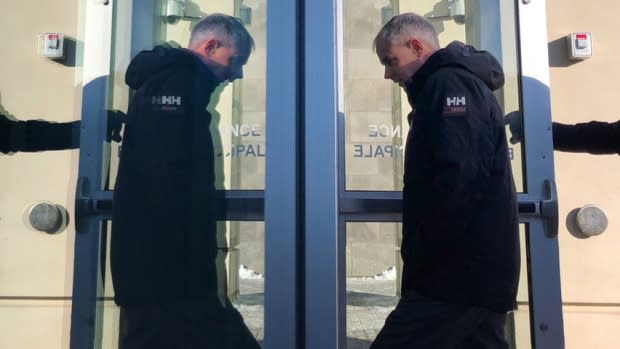
The Crown in its opening statement suggested the "strained nature" of the father-son relationship may have played a role in the homicide. They argued it was a "crime of passion."
Lacy: "Was your relationship with your dad a perfect relationship?"
Oland: "No, it was not."
Lacy: "Were there times when there was issues between you and your father?"
Oland: "There definitely was, yes."
Lacy: "Were you accurately describing your relationship to [Const. Stephen Davidson in your July 7 statement] in terms of some of the ups and downs or the valleys in particular?"
Oland: "Yes, I was."
Lacy: "Did you visit with your parents from time to time?"
Oland: "Yes … If Dad was around, he would come on a Sunday. … He would just drop in … It could be 10 o'clock in the morning, it could be two o'clock in the afternoon. He would just come in and he'd ask for a beer and we'd sit down and chat."
Lacy: "What sorts of things would you and your dad talk about?"
Oland: "Politics. We'd talk about some of the community activities we were involved in, like the Y, or things like that."
Knee: "Nowhere in your statement to the police … did you say anything about, 'We had this great relationship where we would chat every Sunday,' did you?"
Oland: "I said many things about the good parts of our relationship throughout my … statement. As I said to you earlier, I explained to Const. Davidson the positive parts of our relationship and the negative parts."
Knee: "Your father was not the easiest guy to get along with, was he?"
Oland: "No."
Knee: "And the truth is, it was easier for you to just stay away from your father?"
Oland: "There were times it was definitely that way, yes."
Knee: "Staying away from your father kept the peace? … It was the best way that you could avoid conflict with him?"
Oland: "Yes."
I wish I had a better relationship with my father, and there were times when it was troubled. - Dennis Oland
Knee: "Overall, you found your father to be a really difficult person to get along with?"
Oland: "He was difficult, yes."
Knee: "You spent the first hour [of your police statement] discussing at length what I'm going to suggest was a troubled relationship?"
Oland: "I wish I had a better relationship with my father, and there were times when it was troubled."
Finances
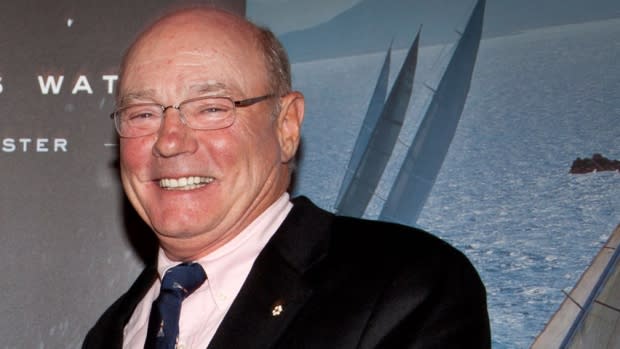
The Crown has suggested Oland's deepening debt as a possible motive, describing him as being "on the edge financially." His line of credit and credit card were both maxed out, he had received a $16,000 advance on his pay, was overspending by about $14,000 a month, and his monthly $1,666.67 interest payment to his father on a $500,000 loan bounced the day before the killing.
Lacy: "The Crown says you were desperate financially … and maybe that came up with your father; you went there looking for money on July 6, 2011. Did you talk to your dad about money on that day?"
Oland: "I did not, no."
Lacy: "Did you know when you went to your father's office that that cheque [to him] had been deposited and had been returned [for insufficient funds]?"
Oland: "No, I did not."
Lacy: "If you had known on July 4 or 5 that the money was not in the account to cover the cheque that you had given to [your father's secretary Maureen] Adamson, what steps would you have taken, if any?"
Oland: "I would have asked Maureen to just wait another day or two, hold off cashing the cheque."
Lacy: "From your perspective, would that have been an issue?"
Oland: "No, based on past record, not at all."
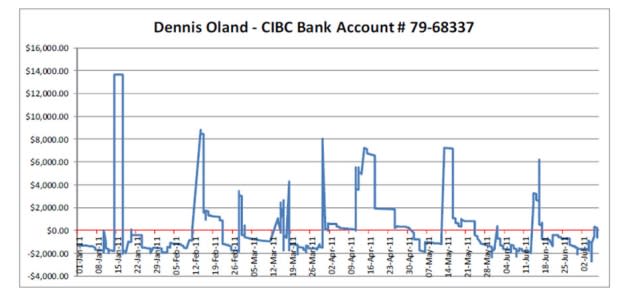
Knee: "On July 6, 2011, you were at risk of losing the ancestral home again?"
Oland: "That's an exaggeration."
Knee: "Did you miss a mortgage payment?"
Oland: "Yes."
Knee: "Did the bank have a right to take your home if you missed a mortgage payment?"
Oland: "Yes."
Knee: "That was the financial distress you were in when you visited your father, correct?"
Oland: "It was not financial distress. I agree it was tight but …"
Knee: "You had no resources left except taking money on your credit card that morning but sir, you're going to suggest today you were not financially distressed?"
Oland: "No, if I felt distressed I would have taken [steps] to rectify it."
Knee: "Borrow more money?"
Oland: "Sure, yes."
Father's affair
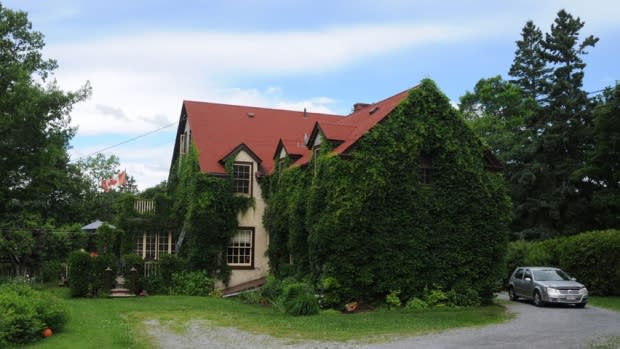
The Crown has suggested the extramarital affair Richard Oland was having with local realtor Diana Sedlacek might have also played a role in his death. Prosecutors contend Dennis Oland "did not approve."
Lacy: "You knew about the affair with Diana Sedlacek, [the prosecutors] say. Is that true?"
Oland: "I knew of a rumour of the affair, yes."
Lacy: "Did you have any discussion with your dad about any affairs he might have been having?"
Oland: "No."
Lacy: "Do you recall having raised that issue with anyone else?"
Oland: "Yes, with Bob McFadden . … He was over at my office a year or two before dad died and it was there that I broached it with him. I asked him if knew anything about it and I think I even said, 'You don't have to answer.' And I just, I think I further said, 'Perhaps you might suggest to him that he keep it quiet or tone it down,' or I may have also said, 'or consider ending it.'"
Lacy: "Is there anything beyond that that you said to Bob McFadden about the affair and what he should do about it or what you would do about it?"
Oland: "No, I don't recall anything like that, no."
Knee: "You felt that your father had a whole life outside your family, would you agree with that?"
Oland: "Yes — sailing, fishing …"
Knee: "Girlfriend?"
Oland: "Possibly, yes."
Knee: "And about a year before his death you began to be concerned about that affair?"
Oland: "Curious."
Knee: "Concerned enough to raise it with Bob McFadden, his right hand man, correct?"
Oland: "Yes."
Knee: "And you talked about it with your sister Lisa [Bustin] as well?"
Oland: "Yes, Lisa would talk to me about it, yes."
Knee: "In your statement to police, you said, 'She knew a whole lot more than the rest of us did and she was convinced that this was a legit thing and that … he was a dirty pig, I guess.' Because of this affair, you agreed with your sister when she characterized him as a 'dirty pig,' didn't you?"
Oland: "No."
3rd trip to office

Dennis Oland only told police about making two trips to his father's office on the night he was killed. During his first trial, he revealed a third trip, testifying he went back to pick up an old camp logbook for his uncle.
Lacy: "Did you tell [police] about going back to get the logbook?"
Oland: "Unfortunately no, I did not."
Lacy: "Were you trying to lie to the police by omitting that?"
Oland: "Not at all, no."
Knee: "Of all the details you could remember, you didn't tell the Saint John Police Force about a third visit?"
Oland: "That's right."
Knee: "I'm going to suggest to you Mr. Oland that you didn't want them to know about a third visit."
Oland: "Absolutely not. As I said before, it was the most difficult day in the world. And you don't know what's significant, you don't know what isn't. You're totally a mess. You do the best you can. I did the best I could."
Knee: "Mr. Oland, you didn't tell them about the third visit because that's when you went back to kill your father."
Oland: "Absolutely not."
Stopped at wharf
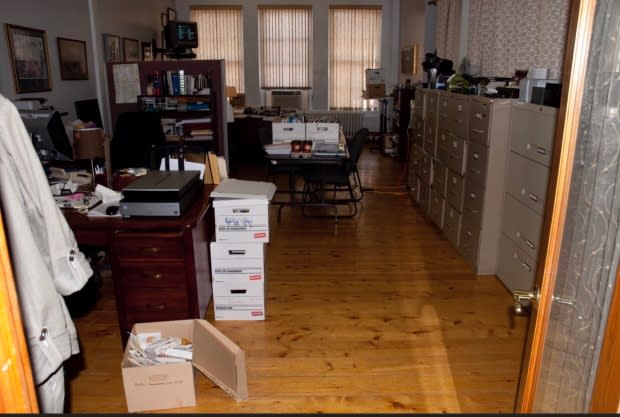
Oland told police he had stopped at the Renforth wharf on his way home to Rothesay after visiting his father and he was seen there by two witnesses, the courtroom heard.
Lacy: "Why did you [stop at the wharf]?"
Oland: "It's something that I do when I don't have my kids for the week [when they're with their mother]. I was hoping that I might be able to see one or two of my kids there that evening."
Lacy: "Did you get rid of anything at the wharf?"
Oland: "Did I get rid of anything?"
Lacy: "Yeah."
Oland: "No."
Lacy: "Did you throw any kind of tool or weapon away?"
Oland: "No."
Lacy: "What did you do at the wharf?"
Oland: "At the beginning of the wharf … I noticed some beer bottles. I picked those up, walked to the end of the wharf and looked for my kids over the edge because there were kids in the water. I didn't see them. I believe I sat down for a minute then got up and left."
Knee: "Mr. Oland, you knew your kids wouldn't be at the Renforth wharf swimming that evening, after 6:30 p.m."
Oland: "I disagree with you … that is a local hangout."
Knee: "At 5:05 p.m., you knew that Emily was [at your ex-wife's]?
Oland: "Yes."
Knee: "You knew Henry wasn't home from New River?"
Oland: "Yes."
Knee: "Hannah's kayaking was done?"
Oland: "Yes."
Knee: "You knew your wife was sick and wanted you home, correct?"
Oland: "Yes."
Knee: "But you decided to stop at the wharf?"
Oland: "Yes."
Knee: "I'm going to suggest to you sir that you didn't visit the wharf that day to see your kids."
Oland: "I absolutely disagree with you."
Missing cellphone

The victim's iPhone is the only thing of his found missing at the crime scene. The final communication it received was a text message on July 6 at 6:44 p.m., which was transmitted by a cell tower in Rothesay near the wharf where Oland stopped at around that same time.
Lacy: "When you left your father's office, did you take his cellphone with you?"
Oland: "No, I did not."
Knee: "When asked [by police] to explain why you suggested a crack head [may have been involved in your father's death], you said that, 'These people seem to rob places for drug money or electronics and try to sell it.' Sir, I'm going to suggest to you that you gave that answer as an explanation to the police as it gives a reason as to why Mr. Oland's cellphone was missing."
Oland: "No."
Knee: "But sir, nothing else was missing."
Oland: "I understand. I was not trying to be dishonest with the police."
Bloodstained jacket

Dennis Oland told police he was wearing a navy blazer when he visited his father on the night he was killed, but security video showed he was wearing a brown sports jacket. The jacket was later found to have four small bloodstains on it. DNA extracted from three of the stains matched his father's profile.
Lacy: "You told the police on July 7, 2011 that you were wearing the blue jacket on July 6. You were in fact were wearing the brown jacket. What can you tell us about that?"
Oland: "What I can say is that on the morning of July 7, I was wearing the blue blazer and I think that just because it was briefly enough that I was wearing it, that I had it in my head I must have been wearing it the day before. That was a mistake, wrong. The information that I gave to Const. Davidson, wrong."
Lacy: "Were you trying to purposely mislead him?"
Oland: "Absolutely not."
Lacy: "Were you trying to hide that fact that you had been wearing the brown jacket when you went to visit your father?"
Oland: "I was not trying to hide anything."
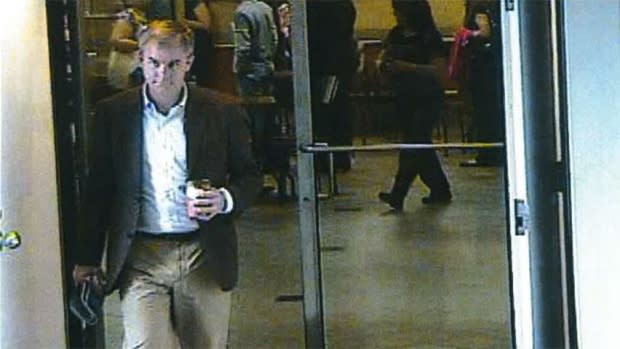
Knee: "Sir, you recalled minute details about our dad, but you expect us to believe that the only thing you couldn't remember was the jacket you were wearing?"
Oland: "There was other things that I couldn't remember … You can't imagine how difficult a day that was. You can't imagine the sadness and the shock and I tried very very hard to remember that day, to remember everything. It was a very, very difficult time, I tried very hard."
Knee: "Sir I'm going to suggest to you that you weren't mistaken when you didn't tell police the colour of our jacket that you were wearing, you were lying."
Oland: "I absolutely disagree with you."
A jury found Oland guilty in December 2015, but the New Brunswick Court of Appeal overturned his conviction in October 2016 and ordered a new trial, citing an error in the trial judge's instructions to the jury. He is being retried by judge alone.
Closing arguments are scheduled for May 9. Justice Terrence Morrison has said he doubts he'll deliver his verdict before June 7.

